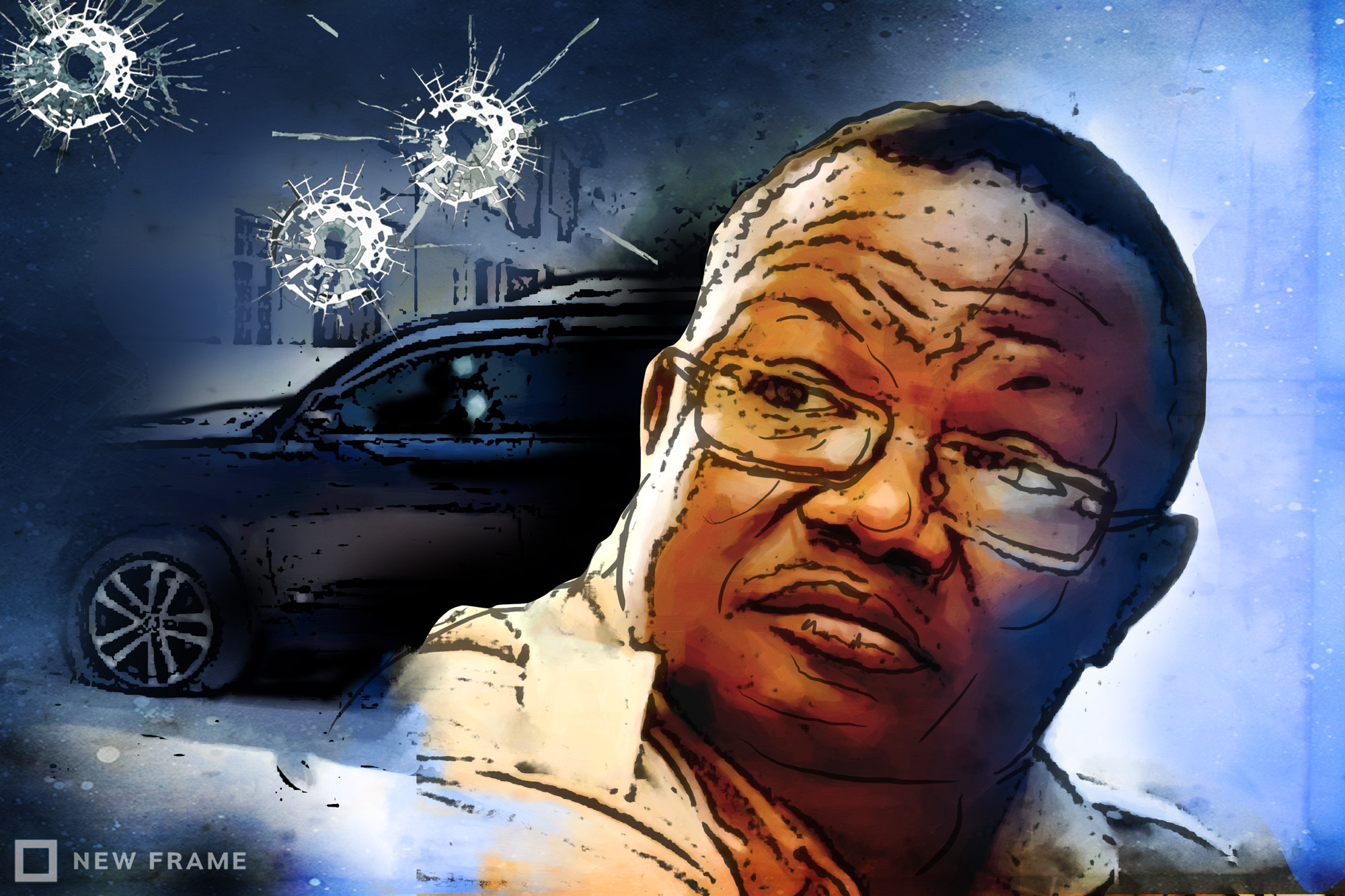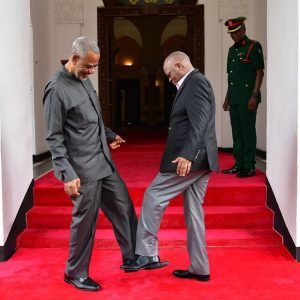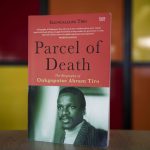Tanzania’s firebrand Tundu Lissu
Sixteen bullets weren’t enough to shut up this activist-turned-MP. Tundu Lissu speaks about surviving an assassination attempt and his concerns for the future of his country.
Author:
21 May 2020

Tundu Lissu, a human rights lawyer and one of Tanzania’s most popular and outspoken opposition leaders, limps down the icy pavement in the small Belgian city of Tienen, about 44km outside Brussels.
“Living here, you realise how much the sun has blessed us in Tanzania,” the 52-year-old says. Lissu, the vice-president of Tanzania’s main opposition party Chama cha Demokrasia na Maendeleo (Chadema), softly chuckles, his breath a cloud of steam.
Lissu arrives at his modest apartment a few minutes’ walk from the city’s train station and opens the door, releasing a wave of warm air into the building’s corridor. His television, positioned in the centre of his living room, blares international news in the background, while various historical and legal books, files and documents line the surrounding bookshelves.
“I look so sombre in that photo,” he says after I take his portrait, stretching over his living room table to show him. “Well, the story is about you surviving an assassination attempt, so perhaps looking sombre is appropriate,” I reply.
Lissu, the former member of Parliament for Singida East, erupts into howling laughter. His smile lights up his entire face and his laugh is deep and contagious. “This is how I respond to the assassination attempt. I laugh at it,” he says.
Indeed, it is only Lissu’s gait that gives away the fact that in September 2017 still unidentified shooters unleashed dozens of bullets into Lissu’s car –16 of which struck his body. It is widely believed that the shooting was an assassination attempt ordered by Tanzania’s President John Magufuli.
Lissu was airlifted to a hospital in Nairobi, Kenya, and then transferred to Belgium, where he still resides, to receive treatment. He miraculously survived the shooting. Since Magufuli was elected in 2015, Lissu has made it his job to fearlessly challenge the autocratic leader – and more than a dozen bullet wounds were not enough to shut him up.
The assassination attempt
Almost three years ago, Lissu, the former president of the Tanganyika Law Society (TLS), was en route to his home in Tanzania’s capital Dodoma at around 11am for a lunch break during a parliamentary session. He and his driver, whom Lissu raised since he was a child, noticed that two vehicles were following them. Each time they turned or slowed down, the vehicles, which Lissu says were a white Nissan SUV and Toyota Land Cruiser, would follow suit.
Lissu is no stranger to run-ins with authorities. Under Magufuli’s presidency, he has been arrested many times, along with other opposition figures, on “sedition” charges. Lissu was jailed for a week in Dar es Salaam following an article published by the Mawio newspaper, a local weekly, in which he commented on the cancellation of elections in semi-autonomous Zanzibar.
After his first arraignment, Lissu made a statement outside the courthouse. “I warned everyone that after these charges against me, it should be clear that this dictator must be opposed by any sane Tanzanian.” He often refers to Magufuli by the nickname “dikteta uchwara”, which means petty dictator in Swahili.
“I never let up after this,” he says. “I challenged every single statement he made.”
Rights groups over the years have raised alarms over Magufuli’s increasingly authoritarian style of governance. While Magufuli, nicknamed “The Bulldozer”, initially received widespread support from the public, his presidency has been marked by increasingly repressive laws aimed at stifling freedom of speech and the media, while he has sowed fear and banned political rallies.
Journalists, opposition figures and critics are routinely harassed, threatened and arrested. In 2018, Twaweza, a Tanzanian NGO, released a poll that showed Magufuli’s approval rating had dropped by 41%. Following the poll’s publication, authorities confiscated Twaweza’s executive director’s passport after questioning the status of his citizenship.
But on this September day almost three years ago, Lissu had not said anything out of the ordinary. “I kept thinking, ‘I don’t remember making any crazy statements over these past two weeks.’ Usually I say the kind of crazy things that I’m known for and then the next day or two they come and get me,” he says.
“The two weeks prior I had been very quiet by my standards. I kept asking myself, ‘What did I do this time?’ But I wasn’t worried. I thought they were the police because it’s the police who always come to arrest me.”
Related article:
The vehicles continued to follow Lissu for about 15 minutes to his apartment compound. “I live in a government housing compound. It’s a place where ministers and all the big people live,” Lissu explains. “The place is always secure.”
According to Lissu, there is only one entrance to the compound that has round-the-clock security and guards are also positioned in front of each apartment block. But on this day, the main gate was open and there were no guards in sight. “It didn’t strike me as odd at first,” Lissu says. “It was only after all of this happened that we started to question why there was no security at the compound.”
The two vehicles followed Lissu’s car into the apartment complex. Oddly enough, however, the compound’s parking lot, which is usually empty, was packed with cars. There was only one parking space left, which Lissu’s driver quickly pulled into. This, Lissu believes, is what saved his life.
“The men were unable to find a parking space,” Lissu recounts. “They most likely had hoped to get a space right beside me so they could have a clear line of fire, but there were no spots left.” The vehicles stopped and after some discussions between the hit men, two of them stepped out with machine guns and opened fire.
‘Kill him, and make sure of it’
While Lissu always had a thought lurking in the back of his mind that something like this could happen, “there’s ways of saying, ‘ah, it might happen, but…’ It was that ‘but’ that kept me from thinking too much about it. In the end, if you’re scared you won’t be able to operate.”
Lissu was warned by several individuals close to the president to tread carefully with his criticisms, with one high-level official from Tanzania’s ruling party Chama Cha Mapinduzi (CCM) allegedly sending a message to Lissu that he “should be careful and that we’re dealing with a madman here”.
“People kept telling me to be careful, but what am I supposed to do? I can’t possibly stop talking. Should I lock myself in my house and spend the days wondering when and where they will get me?” Lissu says. “Am I going to stop calling him out because he’s not happy? I can’t possibly do that.”
Lissu says that he was told by a former CCM minister and another CCM bigwig, whom he has “no reason to doubt”, that the attempted murder was ordered directly by the president. “The order was to kill him, and make sure of it, and once he’s dead make sure he’s buried within three hours,” Lissu says.
“It made perfect sense since my village is about a three-hour drive from Dodoma. Since I was an MP, if I died there would be a state funeral and a big ceremony in the capital,” he explains. “So they were intent on getting me out of the way before anyone could figure out what was going on to avoid upheavals in the towns and cities.”
Related article:
The changes to Tanzanian society were “immediate” following Magufuli’s election win almost five years ago, Lissu says. “Not many people saw it coming. But some of us did. That’s the main reason I got hit. I was the first one to call out Magufuli, and I saw through him immediately. They hated me for this.”
Magufuli has ordered the arrests of hundreds of Tanzanians over economic saboteur crimes, such as money laundering or tax evasion. While rooting out corruption was a staple of Magufuli’s election campaign and an important issue for the public, the president has been accused of using alleged economic crimes to make arbitrary arrests.
“This is the weapon of choice for Magufuli,” Lissu says. “I knew from the start that we were in for a rough ride.” In Tanzanian law, economic crimes are not bailable. Arrestees are forced to pay exorbitant fines to the authorities or languish in jail indefinitely.
According to Lissu, Magufuli, quite simply, needs the money to implement dozens of national megaprojects he has spearheaded, while Magufuli’s fledgling attempts at revamping Air Tanzania, the country’s flag carrier, have alone cost hundreds of millions of dollars.
“He needs the money for these fancy projects,” Lissu says. “If the economy is not performing well, and he’s not getting the money he wants to finance these projects, then he has to run a shakedown.”
‘Short-man complex’
During a recent visit to the small northern Tanzanian city of Arusha, a Chadema stronghold, many Tanzanians expressed their fears about publicly criticising Magufuli. One resident said: “Do you see what he does to parliament members [referring to Lissu]? Imagine what he could do to us.” When Magufuli is discussed in public, Tanzanians often refer to him by pseudonyms or other monikers like “the big man”.
While Lissu was arrested for his activism under previous administrations, “I have never been arrested for anything other than my disturbances to the government,” he says. What’s unique under Magufuli, according to Lissu, is that the arrests are being made solely for criticising the president.
“Magufuli doesn’t have any skills at all,” Lissu says. “So the best thing you can do with him is just flatter. He’s like a child. You criticise him, however mildly, he takes it very seriously and personally.”
“Magufuli has a sort of short-man complex,” he adds. “I seriously believe he suffers from the fact he’s so tiny. And he’s really tiny. Have you noticed his hands? You have to actually sit with him to truly see how tiny he is.” Lissu breaks out into laughter, banging his fist onto the table.
Then his face turns serious: “But because he’s that insecure it makes him extremely dangerous.”
Widespread criticisms have renewed around Magufuli, who has been residing in his village of Chato in northwest Tanzania for the past several weeks, and his handling of the Covid-19 pandemic. He is one of few leaders in the world who has continued to downplay the seriousness of the disease.
Related article:
Updates on Covid-19 have become increasingly rare and the government has been accused of covering up deaths and hiding the true extent of the outbreak.
“Worldwide, all government and state leaders are at the forefront of their national fight against Covid-19. But Magufuli, who has been hogging our TVs for the past five years, has literally run to his village and has been hiding there in the midst of disaster,” Lissu says. “He has abandoned the country and left us to our faiths.”
“I think this will sweep Magufuli off the face of the Earth,” he adds. “If we start counting the dead in the hundreds and the thousands, I don’t see him coming back to Dar es Salaam. People will be angry and in tremendous pain. My feeling is he’s not coming back in one piece after this.”
‘Calling out the high and mighty’
The quiet and calm streets of Tienen seem worlds away from Lissu’s life back in Tanzania, where he was often seen boldly standing up and addressing parliament, shouting and waving his hands over the podium, while alleging government misconduct.
Lissu has been an activist for decades in various rights movements in Tanzania, including those associated with land rights and environmental issues, while working on human rights concerns around the mining industry. Almost two decades ago he was arrested, along with Rugemeleza Nshala, another Tanzanian lawyer, over demanding an independent inquiry into the Bulyanhulu massacre in 1996 when 50 miners were allegedly killed or buried alive during a forced eviction of thousands of small-scale miners in the country’s northern region.
In 2010, he took his activism to parliament after being elected MP for the Singida East constituency in central Tanzania. “Parliament is fun. I had a good time in parliament,” Lissu says with a dimpled smile.
“I have been in the trenches for 20 years, and I have the battle scars to prove it. So when I went to parliament I had already become quite notorious for always championing causes against the high and mighty and against the government’s abuses.
“I continued that in parliament and it gave me a very different and very important platform. I took my parliament work absolutely seriously – and I loved it. If you spent 20 years calling these high and mighty out and getting arrested and prosecuted over it, how about doing it on parliament floor where it’s broadcasted live on national television?
“I loved it. I absolutely loved it,” he says. Last year, Lissu was stripped of his parliamentary seat after the speaker of the house claimed that parliament was not made aware of Lissu’s whereabouts.
The second coming
Lissu is determined to return to Tanzania and his name has been floated as the likely presidential nominee for Chadema in the upcoming elections in October. He says that if the Covid-19 situation subsides and he is nominated, he wants to return and run against Magufuli. But “everything is subject to corona,” he says.
Magufuli announced less than two weeks after Tanzania confirmed its first Covid-19 case that elections would continue in October despite the pandemic. But Lissu says he “cannot imagine how we will hold the elections with coronavirus” and worries Magufuli will declare a national emergency and renew it every six months to ensure he retains power.
Despite Lissu not having returned home since the shooting, his popularity has soared back in Tanzania. In Arusha, there was excitement around the possibility of Lissu contesting Magufuli in the elections.
One resident summed up this popular sentiment: “I think if there is one person who can challenge Magufuli, it’s Tundu Lissu.” Others said they would only bother voting if Lissu returned and ran in the elections.
On a bus ride from the village of Simanjiro back to the city, one man complained about Magufuli: “He is a dictator. He’s destroyed the country. You can’t even criticise Magufuli without feeling scared of being arrested… or worse.”
Related article:
Another man who was seated next to him chimed in: “Usiwe na wasiwasi. Tundu Lissu atakuja kama Yesu. [Don’t worry. Tundu Lissu will come like Jesus]”, implying Lissu would return and save Tanzanians from Magufuli’s rule.
When I tell this story to Lissu, he winces. “I don’t like this,” Lissu says. “I don’t like this Messiah complex. I’m definitely not a Messiah. They would be horrified if they really knew about my views.”
But he admits that he is aware of the impact he has on Tanzania’s public. “I know that I have some influence and it has grown bigger with the shooting, not just because of the shooting but because almost everything I said about Magufuli has come to pass,” he explains.
“Think about all the bad stuff that has happened in Tanzania. There’s millions of Tanzanians who hate the situation they have found themselves in and they need some hope to cling onto, and they need someone they can rally around.”
Lissu’s wife and his driver have considered applying for asylum in Belgium. Lissu, however, has refused and is intent on returning to his beloved Tanzania. “The Belgian authorities don’t understand me at all,” he says. “They tell me: ‘Look, our asylum law was made for people like you. It’s an open-and-shut case.’
“But if I don’t return, what would I do? Someone who is so engaged in public affairs the way I am, I don’t think I would be able to do anything else. This has been my entire life. So I have to get back into the trenches. The fight must continue.
“Of course, I’m not suicidal. I love life. I love family. My life is very interesting; it’s sweet even. So I want to live. I don’t want to die. But it’s because I love life that I need to go back to Tanzania.”




